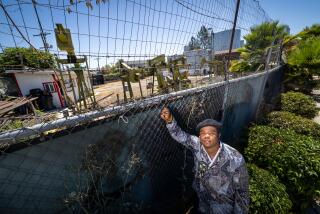Pondering Najee Ali’s place
- Share via
I know there was high-fiving in some circles this week when bombastic black activist Najee Ali was sentenced to four years in prison for trying to bribe a witness in a criminal case against his 20-year-old daughter.
Najee -- everybody calls him that -- has racked up a long list of enemies in a decade spent criticizing police, politicians, parents, even his presumed partners in the trenches of community activism. I imagine they’re chuckling now at the ironies:
Najee’s daughter is accused of causing an accident and fleeing the scene, the same sort of crime that landed Najee behind bars several years ago. His sentence for tampering with a witness in her case seems to some unduly harsh, but no one’s calling for a protest march.
And Najee reportedly agreed to a guilty plea because he wanted to avoid the publicity a trial would bring. This from a man who can’t pass a television camera without giving a speech.
I have to say, over the years I’ve grown to like Najee -- albeit sometimes grudgingly.
I first met him several years ago, when I was covering the story of a South Los Angeles boy who had been murdered and dumped in a trash bin. The only way to the family was through Najee, who had paraded them before cameras at a news conference.
He offered to take me to their apartment if I would give him a lift.
He didn’t have a car. Or a cellphone. Or even a permanent address in Los Angeles. His job, he said, was community activist.
On the way to the family’s cramped apartment, he suggested we pick up a bucket of chicken as a goodwill gesture. I figured it was his route to a free lunch, but when we got there, I was grateful he’d been so thoughtful. They were desperately poor, sunk deep in grief and thankful for something to share with the stream of visitors.
We wound up spending the whole day with them, ferrying them to the cemetery, helping pick out burial clothes, screening calls and accepting donations of money.
And although it was clear that Najee loved the benefactor role -- the spotlight and the chance to be in control -- it was just as clear that he genuinely cared about doing good for others.
The freelance activist jacket fit him well. He knew how to draw attention to his cause, whether it was a protest over a Mexican postage stamp with a racist caricature on it, a black-brown fight on a high school campus or the sex abuse trial of a popular rapper.
It didn’t matter that he wasn’t squeaky clean. Najee traded on his checkered past -- he’d been a gang member and a skid row crack addict, and had served two years in prison for robbery. That gave him street credibility. Other black leaders could do the intellectual heavy lifting.
“I’m the guy with the GED,” he once told me. “When the average black man in the street has a problem, he says ‘Call that Najee brother.’ ”
But I was never convinced that “the average black man” needs a conduit such as Najee. The notion of an anointed mouthpiece as a pipeline to justice has gone the way of Afro picks and dashikis in the black community.
When the nation has a black man poised to assume the presidency, it’s kind of hard to make powerlessness your centerpiece.
I wasn’t able to interview Najee this week because he’s in jail. It’s probably the first time he hasn’t picked up when I called; accessibility was part of what made him a media darling.
The lawyer representing his daughter is convinced that his notoriety contributed to the bribery charge and stiff prison term -- two years, doubled to four because of a 15-year-old robbery sentence and probation violation on his 2004 hit-and-run.
“It was the perfect storm of circumstances against him,” said attorney Anthony Willoughby. “The police wanted to get him, the D.A., the old guard . . . because he was a thorn in their side.
“Najee didn’t realize how much the system wanted to be done with him.”
The idea of Najee trying to bribe someone “is ludicrous,” he said. “Najee couldn’t bribe anybody. He doesn’t have any money. When I heard that, I almost fell out of my chair.”
It was the ideal comeuppance for a peripatetic street fighter whose antics and allegations have embarrassed the “so-called black leadership in this city,” said Willoughby, a Beverly Hills attorney with an impressive civic pedigree who has tangled with the old guard himself. Two years ago, he was beaten in a race for state Assembly by a protege of longtime Rep. Maxine Waters (D-Los Angeles).
“I haven’t agreed with everything Najee’s done,” Willoughby told me Friday. “But I respect that he puts himself out there like that when others don’t.”
Still, it’s hard for me to imagine Najee demonstrating on his own behalf this time; so many of his rants have been about the need for personal accountability. If he didn’t try to influence a witness, he would have held marches proclaiming his innocence this summer.
And if he did do it? With leaders like that, we can do our own talking.
--
More to Read
Sign up for Essential California
The most important California stories and recommendations in your inbox every morning.
You may occasionally receive promotional content from the Los Angeles Times.













